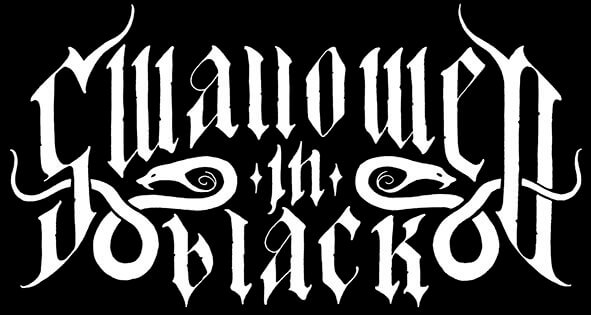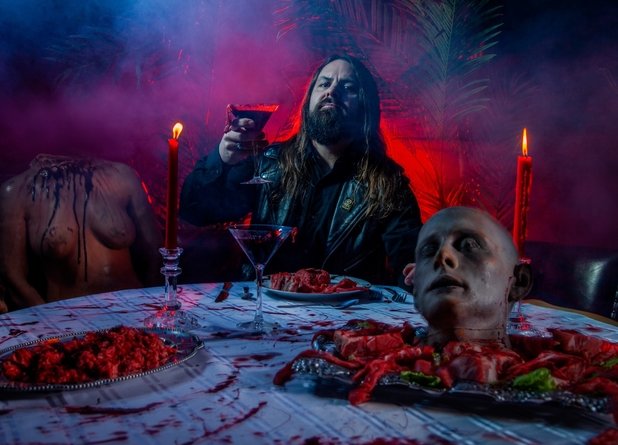“IT WAS KIND OF ANNOYING THAT WE HAD THREE GREAT SHOWS AND THEN SUDDENLY EVERYTHING CLOSES DOWN” – FRED ESTBY (DISMEMBER)
Reborn in blasphemy, legendary Swedish Death Metal pioneers Dismember completed one of the most-anticipated comebacks in extreme music history when taking to the stage for the first time in eight years at Scandinavia Deathfest in October, 2019. Alas, just three gigs into the Stockholm stranglers’ long-awaited resurrection, the ravenous reunion had to be put on ice as plague and hysteria swept the globe and life as we’d known it ceased to exist. The Skinfather himself, Fred Estby, discusses how the indefinite cessation of live hostilities has taken the gloss off Dismember’s triumphant return from the grave; the recriminations of the early ‘90s when the band’s gloriously gore-drenched art attracted the attention of censors and prudes around the world; the creation of Dismember’s iconic, seminal debut full-length, ‘Like An Everflowing Stream’, by five insatiable teenagers three decades ago; and the likelihood of a ninth Dismember LP being carved in flesh.
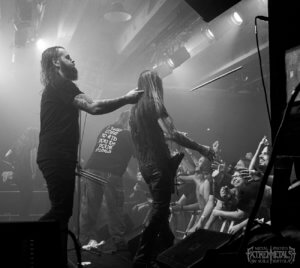 With all life essentially parked on Standby mode for more than a year, we are living in the strangest of times…
With all life essentially parked on Standby mode for more than a year, we are living in the strangest of times…
“It is strange but it’s kinda weird this last month, I think we got it right when it comes to vaccinations. Now everything’s kind of slowly returning to somewhat of a normal day-to-day. The vaccines have been going really well here so …”
It feels like we are stuck in limbo, though. I haven’t worked since March, 2020, which is a complete nightmare.
“Same here, actually. Yes, it is a complete nightmare. My parents in Sweden got their first shot now and that was slow in coming … I got my first shot here in February and I don’t really understand what’s going on in other countries but I guess after this summer, maybe… I’m a pretty restless guy and when this first hit it was not great mentally for me and I was kind of like distraught and felt pessimistic about everything, but I’ve started to find a rhythm with what I needed to do when I realised this was going to go on for a long time and that’s how you cope, I guess.”
There is something decidedly ominous and deeply disconcerting about the avalanche of 2021 gigs being postponed for the second time and rescheduled for 2022. Maryland Deathfest and Netherlands Deathfest are just two of the bigger ones that have been rearranged and it feels like we are stuck in a recurring groundhog-day nightmare. There are other festivals in the pipeline but it seems inevitable they too will fall by the wayside. The vista remains fairly bleak for the future of live events going forward and it feels like we are in the midst of a never-ending vicious cycle of cancellations.
“The worst part is that we might never get rid of this virus so if it’s going to continue and becomes something that we have to live with, fine, but the weird thing here is we had this show from BlacknBlue Productions, who are the main core of the New York Hardcore scene, they put on a show a couple of weekends ago in Tompkins Square Park in Manhattan and they had like between 2,000 and 3,000 people coming for a free show out in the open and I get it, people are kind of over this now and we kind of have to move on, some people might feel, but you know you had some people not wearing masks and pretty tightly packed. Then again, you don’t know how many of those people are vaccinated. Maybe the most part of them were vaccinated and that’s why they went to a show and took that risk.
“It’s hard to see where this is going but I feel like, this summer, across the globe, we might see local shows or national shows going on. I see that there are some punk rock festivals going on in Chicago in September, which is going to be well-attended to say the least, so maybe we can do international shows but how’s this gonna work with all the travel? You know, I have family in Sweden and I don’t even wanna take the risk of travelling internationally right now. Dismember have a show in Sweden scheduled for September and they haven’t cancelled that show yet, but is it gonna be possible to go there and be okay? Here, no restrictions have been lifted for international travel except for family or essential work, so how’s it gonna look later in the year? Are we gonna have these vaccine passports or what’s going to happen?”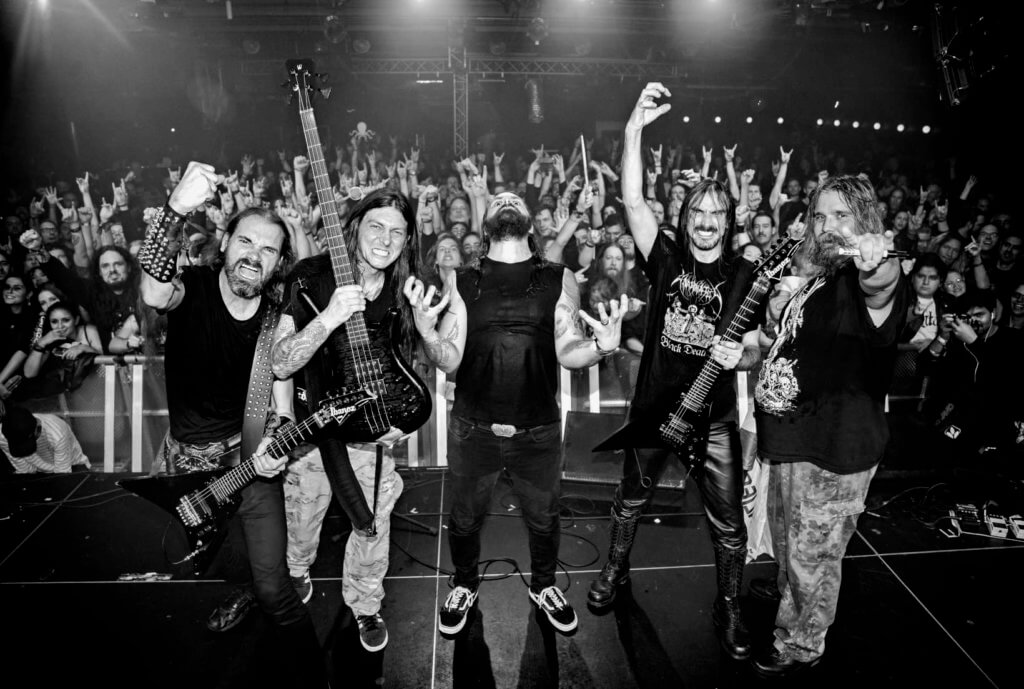
It’s hard to know. I don’t like the vaccine passport suggestion myself as there’s a tyranny involved in that one and it’s politically and ethically very unusual to say the least…
“Yeah, you know, it’s like I understand that and with most of the people I know there’s a divide there and I understand divides and I don’t want to really take any side in this because I can agree to that vaccine passport so that I can go play shows, but at the same time I’m also not feeling great about it because I don’t want to be controlled in that way. But, then again, if governments want to push us they already do so with apps in our smart phones and our computers. It’s not like we are completely anonymous anyway.”
Ordinary people such as ourselves aren’t going to have any say in how this all pans out, that’s for sure.
“Exactly. I’ve been out of work for over a year now because of course I work in the live music industry. I have an opportunity to do some wedding band shows this summer that I might get and that’s what we’re looking at right now. Some venues have opened over here in New York at like 30% capacity but not many venues can staff this and keep going at that level without losing money doing a show under those circumstances, but we’ll see … maybe it changes during the summer, but who knows?”
From Dismember’s perspective, there are still shows in the pipeline but you are probably expecting them all to be placed on the long finger at this point and it’s difficult to see anything happening at least until next year?
“We were supposed to do five or six festival shows last year that are now postponed, so they will happen at some point. We were supposed to do one in London in February as well but I don’t know about the organiser for that one because I haven’t heard back from him yet. That’s the only one I don’t know about; from what I know he didn’t officially cancel the festival. As far as this year goes, we’re waiting to see if Party San Open Air in Germany are going to try to have their festival. Germany doesn’t seem to look that great when it comes to vaccinations either so I don’t see that as an option but I don’t know. The thing that I think is going to happen is that we might do the show in Stockholm but I don’t really see that either because are they gonna have herd immunity by early September? I don’t think so but that’s just a personal opinion.”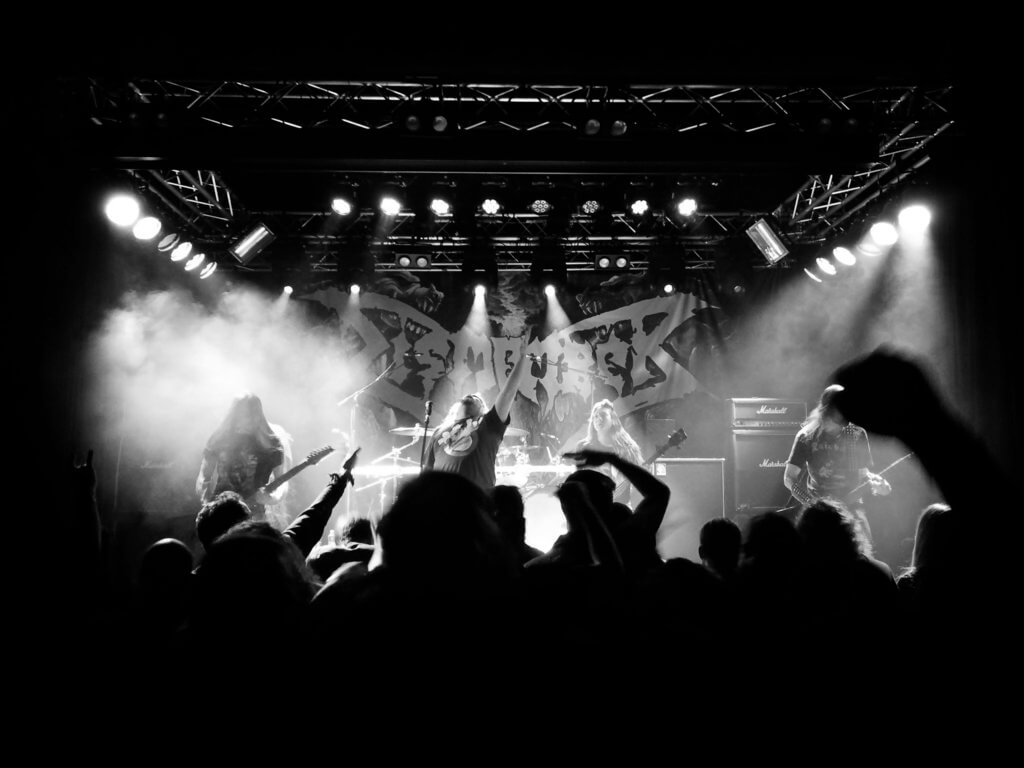
How frustrating has this been for Dismember? The curse of the seemingly-indefinite cessation of live hostilities struck not long after the band reformed and I guess it couldn’t really have come at a worse time? Having returned to the stage, this interruption surely represents a massive blow. To what extent has it broken your momentum, scuppered your plans and perhaps even taken the gloss off your decision to resurrect the band?
“Yeah, it has completely ruined everything we had set up. All the plans. But of course we are working on the reissues now and making sure that our music is available and all that and we’re working on a contract with Nuclear Blast Records – but we’ve been doing that for a long time. There’s a lot to thrash out because there are old licences that haven’t been honoured by old labels and stuff like that, so there’s a lot of legal stuff that still has to be fixed before we can get our music back on digital platforms and then start repressing old albums and put them back in stores and online.
“But, yeah, the whole plan went to hell but it is what it is and that’s the reality for everybody. Of course it was kind of annoying that we had three great shows and then suddenly everything closes down. We got two in Stockholm and one in Zurich in Switzerland and then everything closed down…”
Like some curse…
“Well, you know, we have that kind of saying within the band, even since early on, that we are not like the luckiest band alive. We always said that. David came up with this one that ‘yeah it’s that black cloud following us’, so that’s how we saw it when we had not so much luck or whatever. And it still lingers but it’s not only us – it’s the same for everybody.”
It’s incredible to think that 15 or 16 months have passed already since the third and final of those reunion shows! When was the most recent one?
“We played in mid-January in Switzerland – 2020. We rolled in there, did one show, I flew back and I remember I got kind of sick while I was travelling back to Sweden for rehearsals for that show, I didn’t feel great, and then coming back to the US I was sick for almost a month so I was thinking maybe I had Covid back then but no one really knew what it was then. It was starting to emerge out of China around that time, the reports, as I recall it. They said I didn’t have it but I don’t know. Maybe there was a really bad ‘flu that year but I’ve had a ‘flu shot every year – here in America you can do that; in Sweden you can only do it if you are retired or older – so I do that every year because when you work in live music you meet a lot of people every day and you wanna minimise the chances of getting sick.”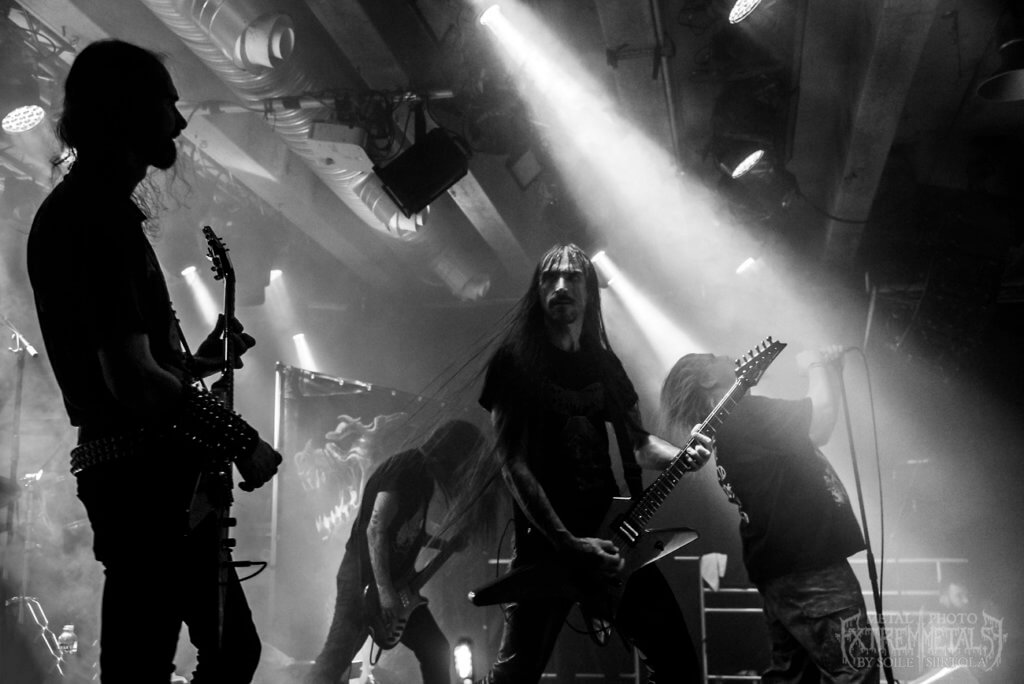
The first reunion gig was Scandinavia Deathfest 2019 in Stockholm. There must have been a serious outpouring of emotion and energy taking to the stage for the first time in eight years. What do you remember of that day? What was it like to finally scratch that itch. Was it a cathartic experience for the band members and everybody associated with the band?
“It was great. I’m getting goosebumps thinking about it now. Just the fact that so many people travelled to it – it wasn’t just people from Stockholm or from Scandinavia or even Europe, it was like people from Mexico, people from South America, Russia, Australia and the only thing that was kind of sad was I didn’t have time to see more people in person because it was the first two shows back together and I’m doing the management and the pre-production for Dismember, I do everything myself. I try to be involved in the shows as much as I can so that everything turns out the best way possible, so I just didn’t have time except for organising the shows and playing them. But, when we started with ‘Override Of The Overture’ and people are actually singing along, that was great.”
Now the hair is standing on the back of my neck! It was a historic occasion in many respects. Did you notice more middle-aged men there than what might have been at previous Dismember shows or had the age demographic of the audience changed at all?
“The day before we played, on the first day of the festival, I was watching Unanimated from the audience and I met a lot of old friends who are my age – all middle-aged with grey hair and no hair and all that – but I was also kinda amazed that I didn’t think the average age of that festival was that high. It seemed like there were a lot of people who are younger who are into this now – a real good spread when it comes to age.”
Was gigging a key driver – or perhaps even the primary one – behind the decision to resurrect the band?
“Yeah. It’s been such a big part of what we do as a band and we are not this stereotypical gloomy, stern kind of band, we are more like the guys for whom half of the reason for actually playing live is that we all travel together and get a good laugh. We play practical jokes on one another and we have a pretty twisted sense of humour … when we get together that’s how we do it. It’s fun to record and it’s fun to make albums and rehearse, but I think we thrive when we play live and when we meet people. All of the band members have always been very interested in travelling and touring and being close to the people who actually come to the shows.”
And presumably it had to be the original line-up or this reunion was simply never going to happen?
“For everybody that was the main thing, that we can’t do it with half the band and we were also like ‘everybody’s still alive, everybody’s still healthy, everybody still plays music to some extent and everybody’s still up for this one more time’.”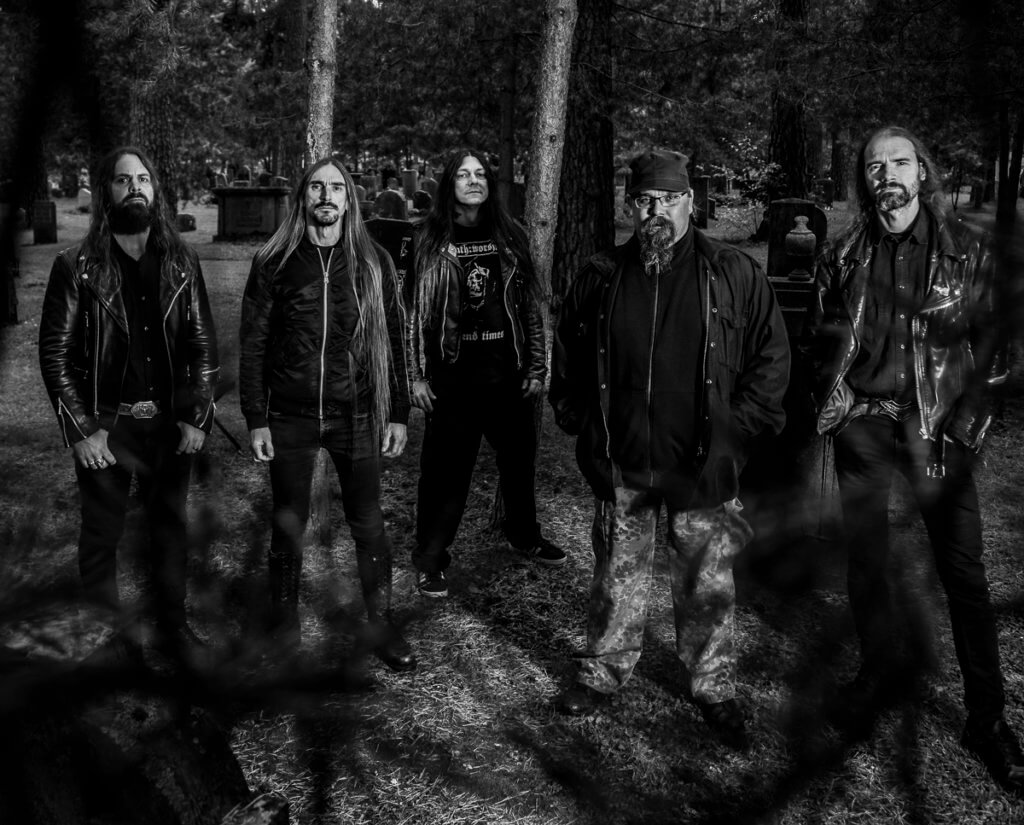
Going back to the decision you made to bring Dismember back from the dead, obviously this was not a choice you took lightly but rather something you thought long and hard about. Your legacy in the Death Metal Hall of Infamy was assured, so nobody could have blamed you if you left well enough alone. You could have easily done a Pink Floyd and left your legacy untouched and not bothered to come back. Ultimately, what was the motivation behind the decision? There must have been an instinctive feeling that the story wasn’t completed yet?
“This band has always been very democratic, except for maybe at the start when I was kind of like the main driver and dictator type, but when you grow up you realise that if you want to make this work properly and everybody’s into it then make it a democracy and everybody’s got a say in it and everybody will contribute. That’s what we accomplished pretty early on as a band and we made sure we had the right sort of music and all that, and that we wouldn’t lose that. All of that made us feel that maybe we could do it again. We were kind of a little bit sceptical about how interested people really were in seeing us back together because when we toured a lot in the late ‘90s / early 2000s, yeah there was interest and there was kind of like a second wave in early 2000 and people were like ‘yeah come out’ and so many people were interested and there was this new generation of Death Metal fans but you are still wondering ‘do people really want to see you play?’. Because we had a hiatus there before from maybe 2000 up until maybe 2003 or something and we went back on the road and it was fun and it was great and we saw new faces and all that but we were struggling. We were touring a lot and really trying to make it happen but we couldn’t live from it. It was tough and not that many people came out to the shows. It felt like everything was pretty saturated, so we were very sceptical for many years after we split up. If we were going to go back to do this, it had to be really good and if there’s not enough money to make a budget for a decent show – or a great show, as we wanted – then what’s the point? It took a lot of people to convince us that the scene had changed and that there were more people into old school Death Metal. It also helps to see this new wave of old school Death Metal bands who are doing the same thing that we did back in the early ‘nineties and to see that they have a good following.”
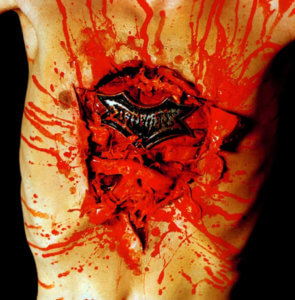 While you had been away, your reputation snowballed and the legend of Dismember as one of the pioneers of Death Metal continued to spread. People who already knew of you looked at Dismember in a nostalgic way and the new generation who hadn’t been there first time around wanted to witness what all the fuss was about. Everybody had an interest and it must have been reaffirming for the band to realise how much regard and esteem you were held in?
While you had been away, your reputation snowballed and the legend of Dismember as one of the pioneers of Death Metal continued to spread. People who already knew of you looked at Dismember in a nostalgic way and the new generation who hadn’t been there first time around wanted to witness what all the fuss was about. Everybody had an interest and it must have been reaffirming for the band to realise how much regard and esteem you were held in?
“We were never the people who wanted to be social media addicts and look out for what people’s interests are. We didn’t think too much about that, which also makes things a little bit problematic when you are doing a reunion like this because you don’t know if people are just talking or if it’s true and how do you determine that just from what you see online? It’s a little like what happened in the early 2000s too when all the social media exploded in the way that that’s how you promote events and shows and popularity and everything and we were kind of not on board with that. We were not in that scene and didn’t have the interest in it. If it says online that 500 are going to go to the show and that’s what the promoter is going to base probable ticket sales on, we realised very quickly that you can’t rely on stuff like that. And I guess other people did too. If someone was lucky and said 500 people are going to turn up to this Facebook event that they put up and then 500 or more turned up, then that was a lucky thing for you but that doesn’t mean that it’s going to be like that for every show you promote on the internet. We got a little bit jaded and put down by that fact that we were seeing that happening and we felt that we weren’t trusting people too much.”
Can you still remember the very first Dismember gig? I believe it was in 1988 and you were only 16 years old?
“Oh yeah, absolutely. It was in a suburb outside of Stockholm. Back then we were so young that we couldn’t get any shows anywhere in the city. There weren’t any venues that were allowing any people underage or anybody under 20 to play the shows or even get into the venues, so we had to rely on the DIY scene, like the punk rock scene, and they had occupied a building that was going to be torn down. They were putting on shows there so that’s where you could go. There was no alcohol, no drugs, everything was drug-free. Everything was DIY but managed by older people who had been in the punk rock scene since the ‘70s. They were nice enough to let us play and we played a punk venue out in the western part of Stockholm and it was probably pretty bad but I remember we were so green back then.”
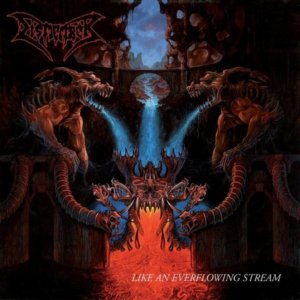 You won’t thank me for reminding you but ‘Like An Everflowing Stream’ is 30 years old this month. Where does the time go?
You won’t thank me for reminding you but ‘Like An Everflowing Stream’ is 30 years old this month. Where does the time go?
“It’s weird because that’s another thing that I remember so clearly – every day of recording that album. Every day, which is like twelve days, but to remember every day and what we did each day is quite remarkable. And it’s not because we were doing anything great; it was just that we had so much fun doing it. It was kind of a relief for us to do after the whole Carnage thing. We felt we have to get our album out and we have a bunch of good songs here and we finally had a band that was coherent after a long period of us just being a trio – me, Matti and David – so it felt like now we have the right unit here and we have the songs … and we have the studio … and we have the label. So everything was falling into place. They even sent Michael, who was the A&R guy for Nuclear Blast Germany back then, he came up and I lived at home with my parents at the time and he stayed with my parents for a couple of days and came to the studio every day and he really loved what he heard. A lot of things came together at the same time.”
What do you think of the album now? To me it still sounds absolutely amazing – do you still like it or do you look at it a little more critically?
“Of course you can’t help yourself from listening to it critically and I have to say this, me being a music producer and sound engineer, I will always be cringing a little bit when I hear my own things and listen back to it afterwards, and it’s not because it’s bad per se, it’s more like you compare yourself to other musicians or producers who are, in your mind, better or to what’s influencing you and you want to sound like that – but that’s not always possible. You never had a problem knowing that this is good or this is bad, this is something that we should just do or this we should toss, we were clear on that. It’s more that listening back to it you hear some stuff you could have done better, but then again it sounds pretty dang good for being recorded and mixed in twelve days for a budget of €1,500. We probably worked 14-16 hours a day and Thomas [Skogsberg] was young back then too and he lived in the studio [Sunlight] more or less, so it was just great. He was loving it, we were loving it, the label was loving it, people were starting to get into this music even in Stockholm, so it was all great.”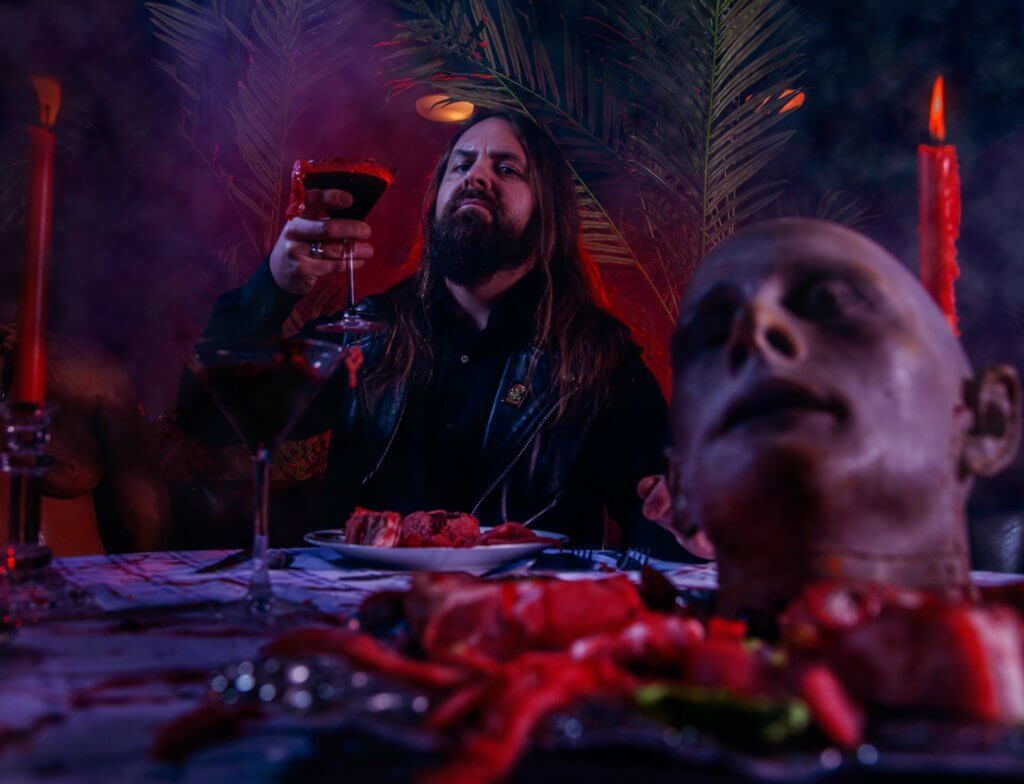
There’s no doubt that the late ‘80s / early ‘90s was a magical time for Death Metal around the world and Dismember were innovators or trailblazers, central contributors to the explosion of the genre onto the global stage. You certainly were part of something historic and instrumental in the embryonic phase of a movement that still resonates around the world today…
“I mean, it was a very small scene in Stockholm and in Sweden when we started out and none of us were thinking that we were going to record an album or play big shows or anything. It was more like we wanted to record a demo, then maybe we could record an album, maybe we could get on a tour with a band that we love. The scene was pretty much non-existent. Even a band like Metallica who I saw for the first time in ’84 in Stockholm in a theatre that held maybe 1,500 people or less, maybe 1,000 people, and then they played this basketball hall on the Master of Puppets tour the night before Cliff died and suddenly the crowd had gone from 1,000 in ‘84 to maybe 3,000 in ’86. To me that was how we saw the rest of the metal scene and the extreme metal scene grow in Stockholm. You went to a Metallica show but outside of that you never saw anyone wear a Metallica shirt. You knew people living in the suburbs, maybe ten people, and then you went to this record store and you got in contact with other people from other suburbs around the city – but that was still a pretty small scene. Even when you went to see a band like Slayer in 1988 when they played the South of Heaven tour, they had maybe 1,000 or 1,500 people in a venue in Stockholm and that’s when you started meeting people from Gothenburg and other cities and those people were wearing Morbid Angel shirts and were also into the more extreme stuff than what you could actually see live.”
Death Metal seemed genuinely dangerous in those seminal days – the freaky brother who came out of the basement – and that was part of the attraction for the impressionable young me. With the gore content in the lyrics and pathological outlook and controversial imagery, there was censorship, bannings and recriminations aplenty. Dismember were caught up in the middle of this and the censors came after you. It was a crazy time…
“With Thrash Metal, people were initially like ‘oh I can’t listen to this, it’s noise’ – that was the main reaction you got. And they looked so scruffy and unwashed these people, like Metallica and Slayer, but then when we did the Death Metal thing it was more about gore and blood and mutilations and stuff like that – that’s when people started to ask ‘is this really art?’. So that kind of helped us a little bit, too. Art should go that way, I think, and that was the main part of making it grow so quickly.”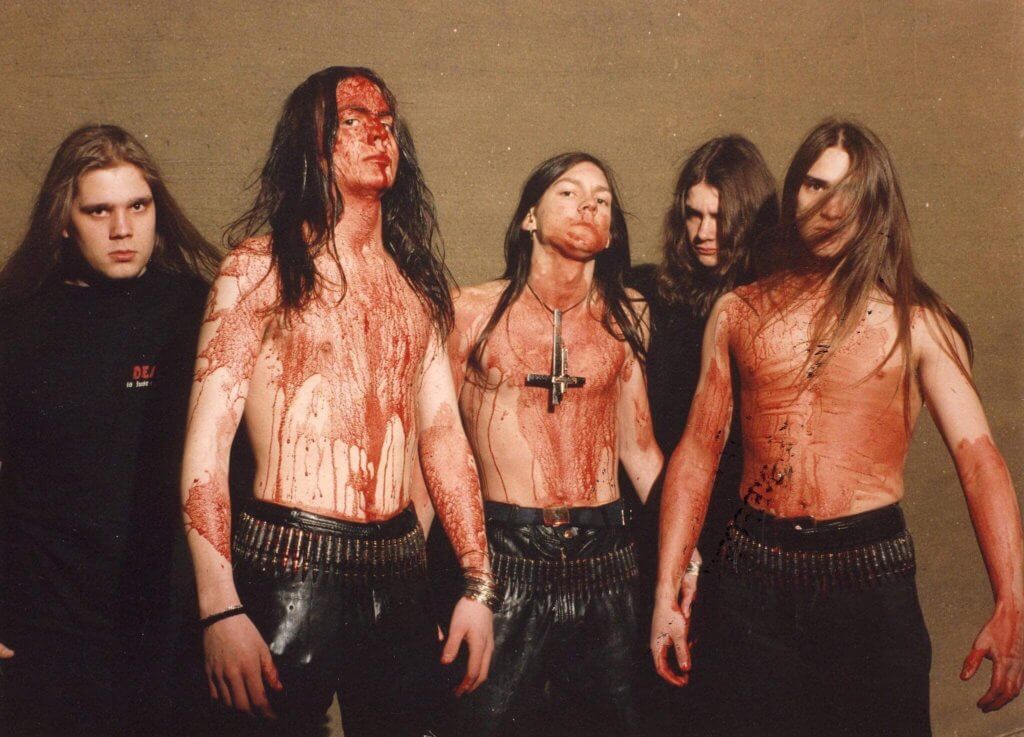
The lyrics for ‘Skin Her Alive’ caught the attention of the censors and your packages were marked by ever-vigilant UK customs officers as Indecent And Obscene – hence the tongue-in-cheek title of your second LP. Was it unwanted attention or did it score you some free publicity?
“It was great. To be interviewed by The Times or have BBC interested in what you are doing suddenly because you are having a court case in England was great and even in the aftermath some countries introduced a heavy fine or even jail on imports with these kinds of lyrics and covers and, as I understand it, that remained for a long time. World of Music was the leading record chain in Germany and they didn’t go to court or anything but they decided ‘we can’t have these album covers on display in our stores’ and they told labels that if they wanted their extreme covers in the stores they would have to manufacture black inlays that cover the cover. Thus, I know that Dismember, Cannibal Corpse and bands like those got censored within the stores instead in certain parts of the world, including here in Europe. I felt that was wrong. I don’t like censorship. This is free speech, this is art. As long as I’m not hurting anyone with my art or offending anyone on a level where they are actually being damaged by it then I think you shouldn’t censor it. We were one of the very few precedents of going through this, which is kind of a cool thing to me.”
Did the controversy and publicity help or hinder you? On one hand it seemed like there was a witch hunt going on, but was it like a red rag to a bull? Did it make you perhaps want to ‘play the game’ and stoke the hornet’s nest by sailing as close as possible to the blasphemous winds?
“Yeah, absolutely. We went worse. We had a showcase in Stockholm and after that we started using blood bombs during our shows and we even had roadies who had buckets of fake blood to throw out on the audience during the last songs and everybody was covered in blood and everything. Some people loved that; some didn’t. We also had one spiel where our special effects guy, who came up with the ‘Pieces’ cover and the ‘Indecent…’ cover, he was onstage with a girl and they were doing this thing where he was dressed up as Leatherface and he was carving this nun open and her entrails fell out onstage. We thought that was great and we were like ‘add more of this to it’. The tabloids were saying ‘what are you guys doing? You are bashing women and degrading women’ but this was not about women, this was an art form and it was about gore and it could just as easily have been a nun slaughtering a priest. It was part of what we did and we kept it going.”
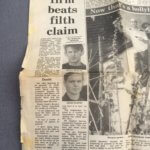 A lot of these more controversial lyrics would have been written when you were a teenager or young adult. When you look back now, as you head for 50 years old, on gruesome lyrics like ‘Bleed For Me’, ‘Skin Her Alive’ and ‘Eviscerated (Bitch)’, do you still stand by them and feel that they represent a vital part of Dismember’s history?
A lot of these more controversial lyrics would have been written when you were a teenager or young adult. When you look back now, as you head for 50 years old, on gruesome lyrics like ‘Bleed For Me’, ‘Skin Her Alive’ and ‘Eviscerated (Bitch)’, do you still stand by them and feel that they represent a vital part of Dismember’s history?
“I don’t regret anything. It depends on how you look at it. A title like ‘Skin Her Alive’ or ‘Eviscerated (Bitch)’ has nothing to do with looking down on women or wanting to kill women, it’s a story told. You can get that in a book or you can get it in lyrics. I think our lyrics have been pretty well written throughout. There are some small parts here and there that don’t so make me cringe but maybe are wrong grammatically since we got better with English. Apart from that, I stand by it.”
There is definitely a misinterpretation of gore / horror from those who don’t listen to or understand Death Metal. Fans can respect and laugh at lyrics from Dismember, Autopsy or Carcass. Obviously you are not condoning or celebrating what is in the lyrics but they are there to shock and entertain, whereas outsiders look at it and say ‘look what these guys are suggesting we should all do’…
“Give me one case where music and lyrics actually made someone go kill someone and where you can actually tell that this was because of the lyrics and the song-writing of this artist and that’s what made this person totally flip and kill other people. There are always other angles and other explanations behind it. Deep down inside we all know that if something like music or lyrics or art or even video games triggers someone to do something weird, then there are other underlying factors that are weighing in much heavier. This is just maybe the final straw or something and that sucks. It’s not like I would be happy if somebody was killed and then it emerges that they were listening to my music before they went out and killed someone. But I think it’s pretty ignorant to say it’s because of lyrics or music.”
It’s been 13 years since the self-titled album. Are or were there plans for a ninth Dismember full-length. Can this happen realistically with you based in the States and the rest of the band in Sweden? The reality might be that with the crisis the world is facing right now nobody can be sure about anything anymore?
“I don’t know. We haven’t really decided whether we are going to do that or not. We have talked a little bit about it, especially now since everything’s just shut down on us, we were talking loosely about how that might be something we could start thinking about. I know that everybody is writing, I’m writing music constantly in case we decide to do so and we have some great material, so … maybe.”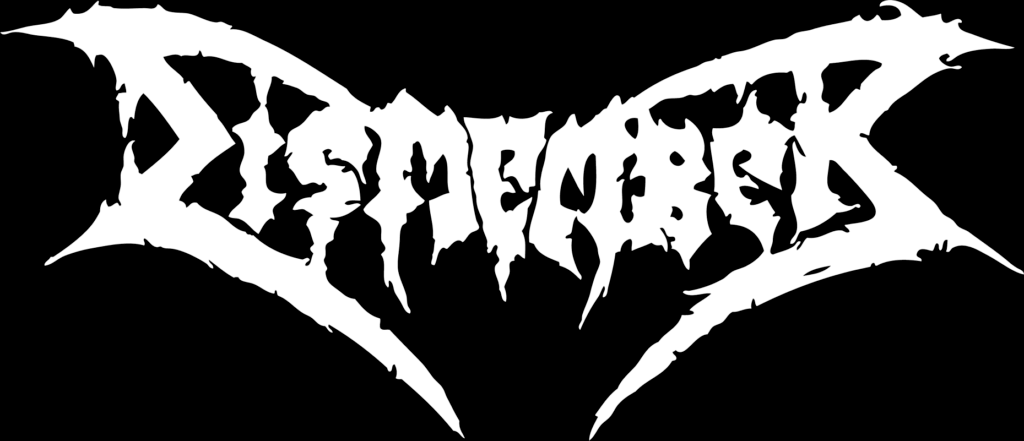
Photo credits:
Fred Estby banquet pics: Nathaniel Shannon
Dismember at Scandinavia Deathfest 2019 (backs to audience): Nathaniel Shannon
Stockholm City Hall, March, 1991 : Gottfrid Järnefors
Stockholm, October, 2019: Nathaniel Shannon
Additional Scandinavia Deathfest live pics: extremmetal.se / Soile Siirtola
Newspaper cutting: The Oxford Mail, July 30, 1992
